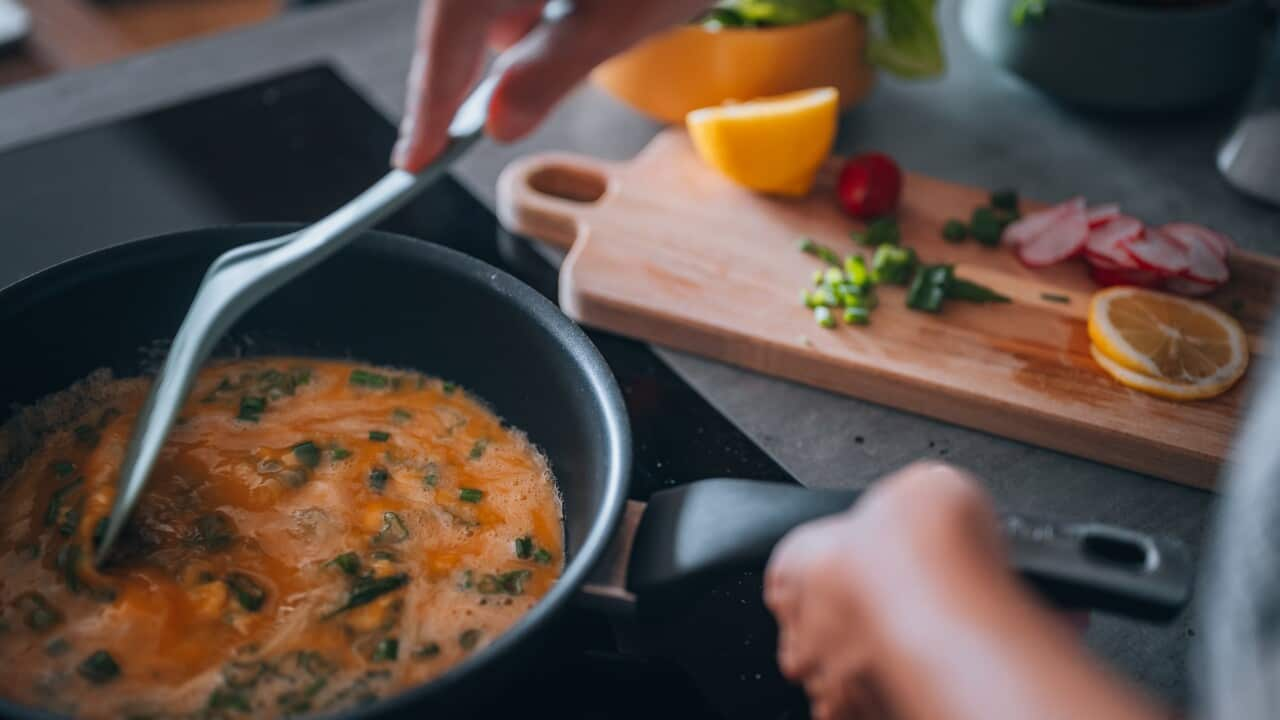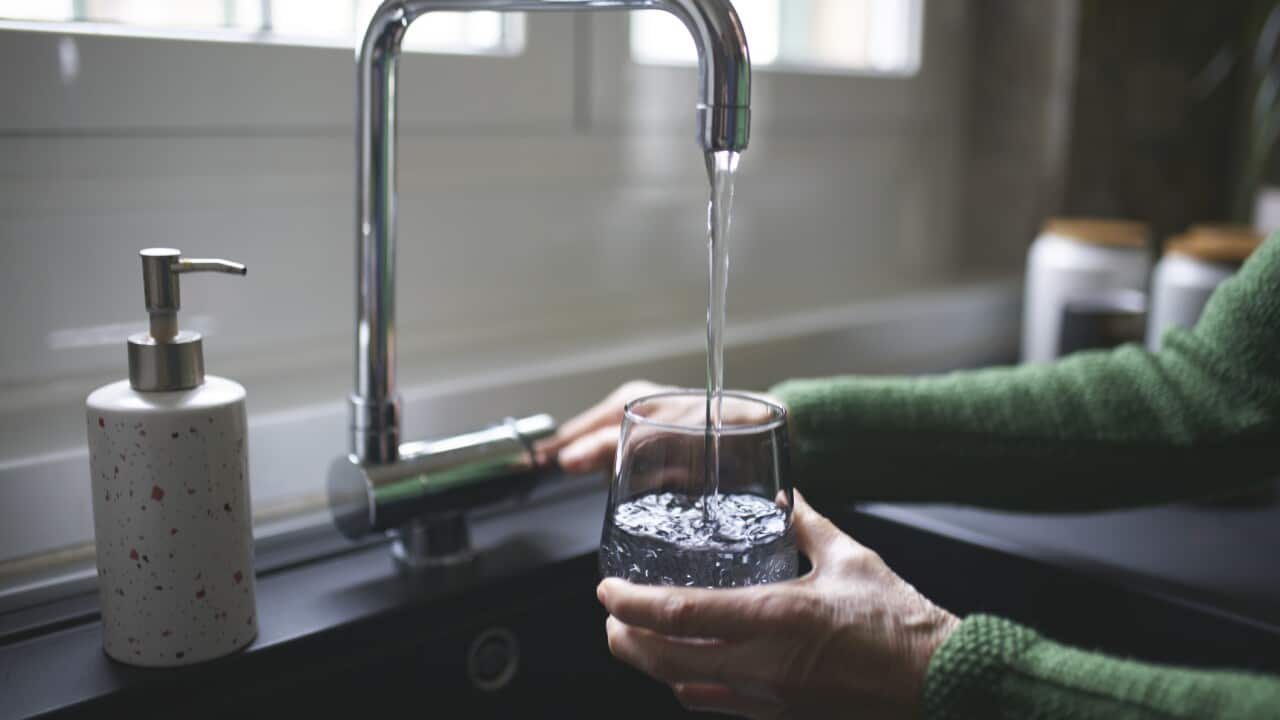It's a concern that has prompted many Australians to rummage through their kitchen drawers and throw out their black spatulas.
Even their non-stick pans.
Reels abound on social media that make you stop in your tracks and wonder just how dangerous those pans, plastic spoons and black spatulas in your kitchen could be, with some people even claiming they're more toxic than cigarettes.
Between purported risks of inhaling microplastics or inadvertently letting dangerous chemicals into your spagbol, concerns about the safety of our cookware seem to be more prevalent than ever.
But Oliver Jones, professor of chemistry at RMIT University, says this fear is unfounded and yet another example of chemophobia — a fear or aversion to chemicals and synthetic substances.
Here's how to tell whether your cookware is safe, and whether you really are gulping down microplastics every time you eat food cooked in a non-stick pan.
Is non-stick cookware safe?
Good news: you don't need to throw out your non-stick pots, pans, or spatulas.
Jones, who researches chemicals, their environments and possible effects, says our fear of unsafe cookware largely stems from a lack of understanding about them, adding that there's no concrete evidence to suggest our non-stick pots and pans are doing us any harm.
"There is no evidence that the level we're exposed to currently in the environment is causing harm," Jones told SBS News.
"It's the old adage in toxicology — the dose makes the poison. Everything can be bad for you at certain levels."
"Teflon's [brand name for polytetrafluoroethylene (PTFE)] actually pretty stable. If you did accidentally ingest any, it would probably just pass straight out," Jones said. "It isn't necessarily doing anything."
While there are concerns about the use of per- and poly-fluoroalkyl substances (PFAS), sometimes labelled "forever chemicals" because they take so long to break down, Jones says our fears are unfounded.
Historically, PFOA, or perfluorooctanoic acid, was used in the manufacturing process for Teflon. It was phased out in 2013 after it was labelled a "chemical of concern" by the Australian government.
Nowadays, Teflon is made with PTFE. Jones says PTFE-coated non-stick pans are safe to use as it only begins to deteriorate at 260C (which would likely burn your food anyway).
Concerns about black spatulas became a talking point after a widely circulated study allegedly found a toxic chemical in black plastic almost exceeded the safe exposure limit for humans.
However, the study was found to have a mathematical error, and the exposure was actually one-tenth of the daily limit.
"The black plastic spatula thing was a big hoo-ha over almost nothing because they were reporting levels that were almost at the PPA safe limit, and then it turned out their maths was wrong and they were a factor of ten out. So they were actually well below the safe limit," Jones says.
LISTEN TO

Do you really know what chemicals are in your cosmetics?
SBS News
08:01
What if my pans are scratched or my spatula is damaged?
Others claim pans and spatulas are only dangerous when they're scratched or falling apart.
That too, isn't entirely true.
While you might want to replace your pans if they're a bit battered, it has less to do with safety, with Jones saying that even if you do consume plastics, they aren't necessarily going to do you much harm.
"If the lining of your Teflon pan is coming off, I don't think it's actually going to do you any harm," he says. "It will probably just pass straight through you."

Our Teflon pans and black spatulas are safe to use, according to Oliver Jones, a professor of chemistry at RMIT University. Source: Getty / Iuliia Alekseeva
"With plastics, it may not be great that you swallow them, but I don't think there's actually any evidence that they'll do you any harm. They'll probably just go straight through you," he says.
"The body doesn't absorb it."
He says for something to have a toxic effect, it needs to interact with the body in some way.
"That could be a physical interaction where it blocks something or a chemical interaction where it binds to a receptor and causes a biological reaction."
The World Health Organization (WHO) advises microplastic levels in food and drink are unlikely to be harmful, but more research is needed in that space.
Jones says while that doesn't mean they're "100 per cent safe", there's no evidence yet that says our kitchen pans are harming us.
"People have been using Teflon for a long time. There's no strong evidence I'm aware of that says it causes any issues."
How can you tell whether your cookware is safe?
While there's no specific type of material that's deemed safer or riskier than another, Jones does recommend sticking to buying pots and pans that are manufactured and regulated here in Australia rather than overseas.
"They're all regulated, and the people who approve the regulations use the same stuff. So why would they put something in there that they knew was unsafe? … The logic isn't all there with some of these social media things," he says.
"If it's bought and tested in Australia, it's probably as safe as it can be."
LISTEN TO

Negotiations reach a critical point to stop the world from drowning in plastic
SBS News
06:23
Jones says it's riskier to buy a pan overseas "because you don't know how it was made or what happened to it beforehand".
He says there are no benefits to choosing other substances, like aluminium, stainless steel or wood, if you're worried about toxic substances.
"In Australia, I think things are pretty safe. But if they weren't, surely we'd be seeing some sort of evidence," he says.
Why do people panic so much about their pots?
Jones describes it as chemophobia
"Chemophobia is relatively common. People tend to only think of the bad side of chemicals — that they're toxic," he says.
"Everything is chemicals. Everything in food is a chemical. Vitamins are chemicals. Water is a chemical.
"There's often a bit of a disconnect in terms of how people assess the risk of different things … we tend to weight things we don't understand much higher than things that we think we understand, even though the thing we understand is much riskier."
While our worries about plastic spatulas and non-stick fry pans might not be based in science, Jones says it's nothing new.
Brandolini's law, colloquially known as the 'bullshit asymmetry principle', is an internet adage that says the effort needed to refute scientific misinformation is higher than it is to create it in the first place.
"Once you've got something out in the public consciousness, people think it and then it's in their brain.
"It takes a bit of effort to convince people otherwise."





